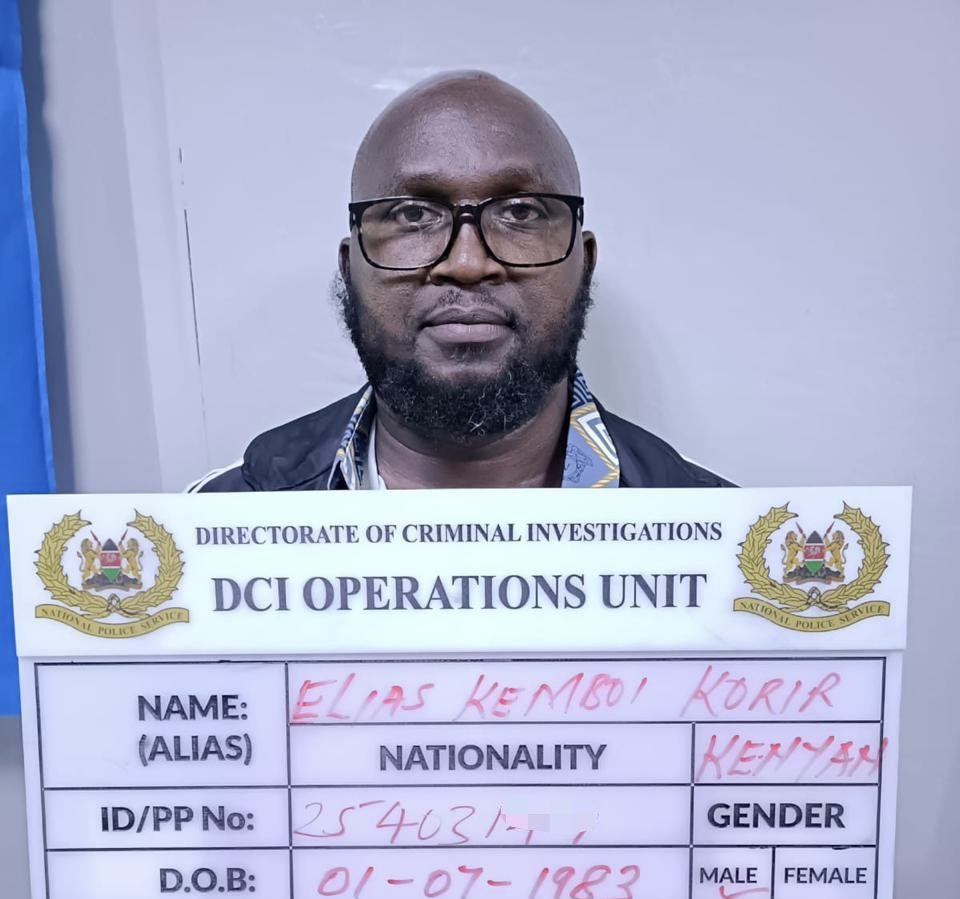News
Deceit in Charity: How Serial City Fraudster Elias Kemboi Korir Weaponised a ‘Briefcase’ NGO to Bleed Nairobi Businesses Dry
For years, Korir, a key official at the Woman and Youth Against Aids and Poverty (WAYAAP), leveraged the NGO’s seemingly legitimate facade to lure businesses into lucrative tender deals.

Nairobi | In the bustling corridors of Kenya’s non-governmental organisation sector, where noble intentions often mask darker dealings, Elias Kemboi Korir emerged as a master of deception.
Posing as a do-gooder championing the fight against Aids and poverty, the 41-year-old Korir allegedly orchestrated a web of frauds that siphoned millions from unsuspecting city suppliers, leaving a trail of shattered trust and empty warehouses in his wake.
For years, Korir, a key official at the Woman and Youth Against Aids and Poverty (WAYAAP), leveraged the NGO’s seemingly legitimate facade to lure businesses into lucrative tender deals.
Registered as a non-profit dedicated to aiding vulnerable women, youth and families, WAYAAP presented itself as a beacon of hope—complete with glossy testimonials and outreach programmes.
But beneath this veil lay a calculated racket: Korir would dangle irresistible contracts for bulk supplies of essentials like sugar, cooking oil and rice, only for the goods to vanish into the black market once delivered, with payments evaporating like morning mist over the city skyline.
The scheme unravelled dramatically in December 2024, when Directorate of Criminal Investigations (DCI) sleuths nabbed Korir at Jomo Kenyatta International Airport, his boarding pass to an undisclosed destination clutched in hand.
He was attempting to slip out of the country amid a mounting manhunt triggered by a Sh32.8 million heist that implicated him and accomplice Halima Samson Mwongela, another WAYAAP insider.
The duo had allegedly hoodwinked three suppliers into parting with goods earmarked for “aid distribution” to the elderly and disabled—only to flog them off in Nairobi’s underbelly markets, pocketing the proceeds.
“These weren’t isolated errors; this was a sophisticated con built on the goodwill of charity,” said a senior investigator from the DCI’s Operations Support Unit, who spoke on condition of anonymity as the probe continues.
The unit’s intervention followed frantic reports from defrauded firms, whose attempts to reclaim their stock or cash were met with stonewalling and veiled threats.
“They’d promise refunds, then go radio silent. When pressed, it was all intimidation—no accountability.”
Korir’s predatory playbook was as audacious as it was repeatable.
Drawing on WAYAAP’s credentials, he targeted wholesalers and distributors with tenders promising swift payments upon delivery.
In one brazen episode earlier that year, he convinced a Kibera-based supplier to offload 100 bags of 50kg brown sugar and 575 jerry cans of 20-litre cooking oil valued at over Sh9 million for a supposed community outreach.
The entrepreneur, who spoke on the condition of anonymity for fear of reprisals, recalled the pitch: “He came with official WAYAAP letterheads, testimonials from past ‘beneficiaries,’ and even a site visit to a warehouse. It felt rock-solid. But the day after delivery, his phone went dead, and the NGO offices turned us away.”
The goods, branded under household names like Mlowo and Unilever, never reached the intended recipients.
Instead, they surfaced in informal markets around the city, flipped for quick cash.
Korir’s operation thrived on this sleight of hand, exploiting the trust gap between cash-strapped SMEs and the allure of NGO partnerships.
“It’s a briefcase NGO at its worst—registered on paper, but run like a ghost company from a rented room,” the investigator added.
WAYAAP’s legitimacy, it turns out, was more mirage than reality; its public footprint consisted largely of sporadic social media posts and unverified impact reports, with little evidence of on-ground delivery.
Korir’s rap sheet stretches back further, painting a portrait of a serial offender who has danced in and out of courtrooms.
In May 2024, he faced Milimani Magistrate’s Court on charges of stealing Sh17.1 million worth of assorted shop goods from Kanduyi Investments Limited between August and September 2022.
Prosecutors alleged he posed as a solvent buyer, securing credit lines under false pretences before vanishing with the haul.
Korir denied the counts, but the case still pending, exposed a pattern: multiple fraud dockets at DCI headquarters, including bounced cheques to Eldoret hardware stores and coerced land deals in his home turf.
By January 2023, the scam had escalated.
At a Nairobi warehouse, Korir was reported to have overseen the intake of one bag and 600 boxes of grade-one rice totaling Sh2.9 million alongside a second consignment of Sh2 million in edible oils.
Again, the ploy was aid procurement, but the trail led straight to black-market sales.
“We’d calculated everything: transport, storage, even donor logos on the packaging. He exploited our desperation for big orders,” lamented another victim, a mid-sized distributor whose firm teetered on collapse after the hit.
What makes Korir’s fraud particularly insidious is its predatory calculus—preying on businesses already squeezed by economic headwinds.
Kenya’s NGO sector, home to over 10,000 registered entities, has long been a breeding ground for such ‘briefcase’ operators, where lax oversight allows bad actors to masquerade as philanthropists.
A 2023 audit by the NGO Coordination Board flagged hundreds of dormant or suspicious outfits, but enforcement remains patchy.
“Donors and regulators must demand transparency: audited financials, verifiable projects, not just feel-good brochures,” urged Mary Wanjiku, executive director of Transparency International Kenya’s local chapter.
As Korir cools his heels in a Milimani cell awaiting further charges potentially including conspiracy to defraud and money laundering—the DCI has cast a wide net.
“We’re appealing to any other victims: come forward. This ring didn’t stop at three suppliers,” the investigator urged, noting tips have already trickled in from as far as Kitui and Nakuru.
Mwongela, the alleged co-conspirator, remains at large, her role in the diversions under scrutiny.
For the fleeced businesses, the scars run deep.
One supplier, staring at a ledger of irrecoverable debts, summed it up starkly: “We thought we were building futures for the poor. Instead, we funded a fraudster’s escape.”
In a city where trust is currency, Korir’s downfall serves as a grim reminder: charity’s veil can conceal thieves, but justice, however delayed, has a way of piercing through.
Korir’s next court appearance is slated for October 2025, where prosecutors vow to lay bare the full extent of his empire of deceit.
Kenya Insights allows guest blogging, if you want to be published on Kenya’s most authoritative and accurate blog, have an expose, news TIPS, story angles, human interest stories, drop us an email on [email protected] or via Telegram
-

 Grapevine6 days ago
Grapevine6 days agoAlleged Male Lover Claims His Life Is in Danger, Leaks Screenshots and Private Videos Linking SportPesa CEO Ronald Karauri
-

 Lifestyle1 week ago
Lifestyle1 week agoThe General’s Fall: From Barracks To Bankruptcy As Illness Ravages Karangi’s Memory And Empire
-

 Grapevine2 days ago
Grapevine2 days agoRussian Man’s Secret Sex Recordings Ignite Fury as Questions Mount Over Consent and Easy Pick-Ups in Nairobi
-

 Investigations2 weeks ago
Investigations2 weeks agoEpstein Files: Sultan bin Sulayem Bragged on His Closeness to President Uhuru Then His Firm DP World Controversially Won Port Construction in Kenya, Tanzania
-

 News2 weeks ago
News2 weeks agoAUDIT EXPOSES INEQUALITY IN STAREHE SCHOOLS: PARENTS BLED DRY AS FEES HIT Sh300,000 AGAINST Sh67,244 CAP
-

 Business2 weeks ago
Business2 weeks agoKRA Can Now Tax Unexplained Bank Deposits
-

 Investigations1 week ago
Investigations1 week agoEpstein’s Girlfriend Ghislaine Maxwell Frequently Visited Kenya As Files Reveal Local Secret Links With The Underage Sex Trafficking Ring
-

 News1 week ago
News1 week agoState Agency Exposes Five Top Names Linked To Poor Building Approvals In Nairobi, Recommends Dismissal After City Hall Probe




























